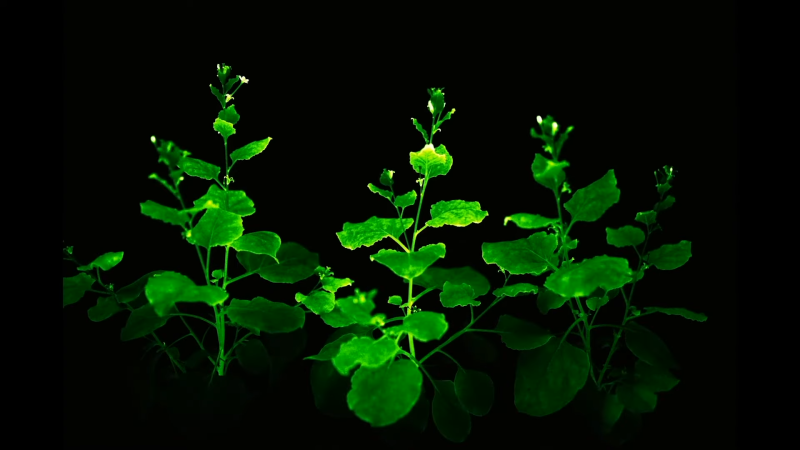Outside of the depths of the ocean, or cartoons, we’re not typically accustomed to plant life glowing or otherwise generating its own light. However, science is helping to change all that. Now, you can order some bioluminescent plants of your very own from Light Bio.
Light Bio is a startup company working in the synthetic biology space. It’s not content to simply pursue research behind closed doors, and is now sharing its work with the public. It has announced it plans to start selling petunias to U.S. customers which literally glow with the magic of bioluminescence.
Petunias don’t normally glow, but with some modifications, it turns out they can be convinced to. It took a large team of 26 scientists to figure out how to boost bioluminescence in plants, by isolating and optimizing genes sourced from various glowing mushroom species.
The plants will be available from April, with Light Bio planning to sell them as “Firefly Petunias.” It might sound like scary sci-fi tech, but the USDA has apparently already signed off on Light Bio selling these to the public.
Something’s been bothering me, though. It’s at the edge of my memory… I think my old housemate played bass for Glowing Petunias back in 2015. Something like that, anyway… video after the break.

















There may be prior art… quick, call Veridian Dynamics!
https://www.youtube.com/watch?v=P5rAOitj5_8
Just look out for the FireSquirrel…
They do mention in the paper that they’ve tried it with mammal cells… ;)
Oh no, not again.
Are those the same guys that did a Kickstarter quite a while ago? I backed that one, but in the end it failed.
https://www.kickstarter.com/projects/antonyevans/glowing-plants-natural-lighting-with-no-electricit/
It’s not the same people. That was my son who attempted this by synthesizing DNA using lasers. This project seems to obtain their results by inserting another plants genes.
Everybody duck, incoming whale!
Just pre-ordered 3 of them. Expensive but oh so cool. Via the link in the story, you’ll see this link where you can actually order: http://www.light.bio/
I’m going to wait until they can produce glowing cats and pre-order a couple of kittens – one green , one red ….. ok, and maybe a blue one as well.
Those have already been done, countless times. They’re euthanised after experimentation, mandatorily.
Trying to save money on lighting?
As if there isn’t already too much light pollution at night.
Petunia non OLED
” USDA has apparently already signed off ” Ya because we can be sure they know what their talking about.
These so called scientists need to stop jacking with plants DNA. It’s bad enough our whole food system has been jack up because of them.
Imagine if one of these genes jumped from food into your body. It could turn you into anything. We need strong laws now to ensure no genetic materials are in food, it’s just too new to know it’s safe.
They always try to convince us that horizontal gene transfer will not happen.
Nature proves the opposite.
When you eat a salad, you might consume genetic material from half a dozen species. Ever had those species enter your genome? Or know of a case where it has?
https://www.sciencedaily.com/releases/2018/07/180709101216.htm
Funny, I was thinking more along the lines of how some dark food coloring turns our poo green.
Thus leading to thinking a salad could perhaps one day give us glowing poo?
Maybe a way to get the kiddies to eat all of their veggies at last?
Joking aside, I’m not sure we ought to be doing this. We can’t get a self driving car coded without glitches yet.
Imagine the uh-oh factor we may find in this.
Could be the basis for another sci-fi story. We end up with a new group of people having eye trouble due to a slight tissue glow?
Glow kicked off by UV light?
Sunlight = daytime blindness?
All of the “White” LED (UV heavy) street lighting?
You say ‘can’t even get a self driving car coded’ like it was an easy thing.
Hint: Self driving is doomed to fail on city streets (short term, say less than 50 years), it’s already done for highways (just not by the AI types, old school methods make lane following and smart cruise work).
Life… uh… finds a way.
And while we’re keeping “genetic materials” out of our food, we should also make sure it doesn’t contain CHEMICALS, right?
or the dreaded dihydrogen monoxide!
I only eat cruelty free, fair trade exotic matter. No chemicals. It may taste a little strange, but it’s not without its charms.
Oh, put a quark in it! :D
Dumbest internet comment award
Totally agree …
It is totally irresponsible to sell this type of genetically modified organism to the public without being aware of their side effects.
To what does “their” apply? “Their” is plural. The only other thing in your sentence that can even vaguely be considered plural is “public.” Are you stating that we must be aware of the side effects of the public?
Side effects to what? Are you eating *petunias?* Why are you doing this?
The GMO market is regulated (in most of the world).
On the other hand there are unregulated alternatives in most of the world (e.g. https://www.primrose.co.uk/blog/plants/what-is-mutation-breeding/ ). But that way is like hoping that a monkey hitting keys at random on a typewriter keyboard for an infinite amount of time will type any text, including the complete works of William Shakespeare. You could produce glowing Petunias with a Cobalt-60 source irradiating millions or billions of seeds daily, but it might take a while. And testing/growing each irradiated seed, and checking for new and exotic properties will cost a lot of money.
Pure wordcel sophistry, and everyone knows exactly what “regulated” means (except you apparently)
Not really, they make a valid point. Radioactive gardening has been done for a very long time, as has been selective breeding – same results in theory could be had, just with far less precise control and thus over many more attempts. And these forms of DNA fiddling are not regulated or barely regulated at all as far as I can tell anywhere in the world, where introducing very deliberately a specific gene for a specific purpose actually having a good idea of the end result…
I’m not saying we should go wild and modify everything in sight because we can, but there really should be a balance. One in which selective breeding is put as much under the spotlight as Genetic modification. And ultimately we have already screwed up the ecology of most of the world with invasive species that are/were entirely natural but native to somewhere else. So if a bit of genetically modified stuff did happen to thrive in the wild it isn’t really a new problem, though most genetic modifications seem to be deliberately made not viable..
> genes sourced from various glowing mushroom species
…Anyone that’s played INFRA knows where this is going.
I want bioluminescent goldfish like Sheldon created on Big Bang Theory.
search for “GloFish”
Has anyone actually seen these things in person? I’m suspicious the the luminosity is not very impressive
What’s the old saying, “When a dog walks on his hind legs it’s not impressive because he does it well but because he does it at all.”
Fireflies aren’t that bright, but they’re still impressive. You just have to be somewhere relatively dark, and let your eyes adjust.
Simple question really. What purpose does this serve apart from keeping some franken-scientists in a job?
I don’t have a concise answer. But it’s same probably as “what good is art anyway?” Or “why climb a mountain” or go to the moon or anything like that. Not meaning to be a smart@$$ but I saw this and just plain thought it was rad as hell and imagined walking through a garden made of those at night like some living sci-fi garden
At a guess, this could have applications in farming (robots can weed anything that doesn’t glow) or developing pharmaceuticals or the like.
I read an article in the past about developing bioluminescence in plants, and the strength of the light was proportional to their need for water. You may not want to eat these petunias, but if you could grow them near other crops they could act as a ‘canary in the coal mine’ to help indicate when non-GMO/bioluminescent plants needed watering. (as an alternative to an electrical device, etc.)
this looks surprisingly familiar to
“what is this robot good for, apart form looking cool and it’s fun to build?”
“probably I could support search and rescue”
If these guys can somehow link this to global warming prevention, as “green light”, they’ll get millions in grants and government funding.
So uhh, the glowing genes are one of the most commonly available for insertion into just about anything. They also generally get bred out over time, since in most cases they’re a waste of energy for the organism. I dunno about petunias, but there’s been various other stuff before.
I was wondering when you guys would cover this :)
Interesting that they finally got it to work by using DNA from “fox-fire” types of fungus (and that it was “an order of magnitude brighter than fireflies” in the case of the petunia flower-buds).